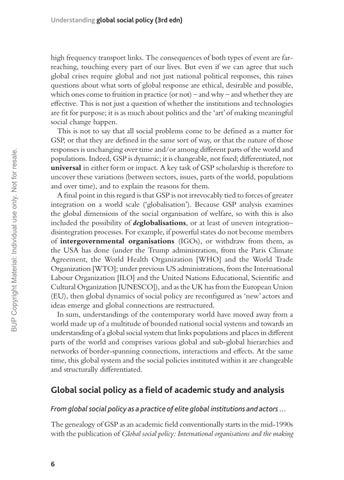BUP Copyright Material: Individual use only. Not for resale.
Understanding global social policy (3rd edn)
high frequency transport links. The consequences of both types of event are farreaching, touching every part of our lives. But even if we can agree that such global crises require global and not just national political responses, this raises questions about what sorts of global response are ethical, desirable and possible, which ones come to fruition in practice (or not) – and why – and whether they are effective. This is not just a question of whether the institutions and technologies are fit for purpose; it is as much about politics and the ‘art’ of making meaningful social change happen. This is not to say that all social problems come to be defined as a matter for GSP, or that they are defined in the same sort of way, or that the nature of those responses is unchanging over time and/or among different parts of the world and populations. Indeed, GSP is dynamic; it is changeable, not fixed; differentiated, not universal in either form or impact. A key task of GSP scholarship is therefore to uncover these variations (between sectors, issues, parts of the world, populations and over time), and to explain the reasons for them. A final point in this regard is that GSP is not irrevocably tied to forces of greater integration on a world scale (‘globalisation’). Because GSP analysis examines the global dimensions of the social organisation of welfare, so with this is also included the possibility of deglobalisations, or at least of uneven integration– disintegration processes. For example, if powerful states do not become members of intergovernmental organisations (IGOs), or withdraw from them, as the USA has done (under the Trump administration, from the Paris Climate Agreement, the World Health Organization [WHO] and the World Trade Organization [WTO]; under previous US administrations, from the International Labour Organization [ILO] and the United Nations Educational, Scientific and Cultural Organization [UNESCO]), and as the UK has from the European Union (EU), then global dynamics of social policy are reconfigured as ‘new’ actors and ideas emerge and global connections are restructured. In sum, understandings of the contemporary world have moved away from a world made up of a multitude of bounded national social systems and towards an understanding of a global social system that links populations and places in different parts of the world and comprises various global and sub-global hierarchies and networks of border-spanning connections, interactions and effects. At the same time, this global system and the social policies instituted within it are changeable and structurally differentiated.
Global social policy as a field of academic study and analysis From global social policy as a practice of elite global institutions and actors … The genealogy of GSP as an academic field conventionally starts in the mid-1990s with the publication of Global social policy: International organisations and the making
6

